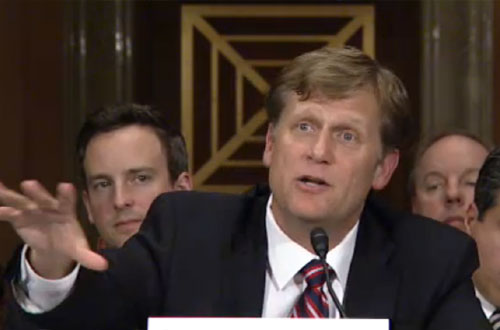
U.S. Ambassador-Designate to Russia Speaks of Georgia
- No way for Russia ‘to go around Georgia’ over WTO;
- Supporting Georgia’s security is ‘top priority’;
- U.S. supports Georgia ‘in a multifaceted way’;
- Russia, Georgia ‘tensions remain too high’
- Liberal democracy ‘important part of making Georgia more secure’

A video grab showing U.S. ambassador-designate to Russia, Michael McFaul, speaking at the Senate Foreign Relations Committee, October 12.
Georgia’s territorial integrity and strengthening Georgia’s security "remains a top priority for Obama administration," said Michael McFaul, a top White House adviser on Russian policy, who has been nominated as U.S. ambassador to Moscow.
During his nomination hearing at the U.S. Senate Committee on Foreign Relations on October 12, Mcfaul said that the U.S. considered Russia’s occupation of Georgian territories of Abkhazia and South Ossetia "to be a very serious issue."
He said, that the U.S. support to Georgia’s security was done "in a multifaceted way".
One of the directions, he said, was on the diplomatic front, involving discouraging other countries from recognizing Abkhazia and South Ossetia. McFaul said that was the issue on which the U.S. and Russia "radically disagree".
Being "very persistent" in reaffirming Georgia’s territorial integrity at various multilateral forums was also part of the diplomatic efforts, McFaul said.
"Third – we support Georgia’s Euro-Atlantic aspirations. Fourth – we continue to press Russia to adhere… to 2008 ceasefire agreement, which we believe they are not respecting. Fifth – we continue to push for international monitors and greater humanitarian access to Abkhazia and South Ossetia. And sixth – we work directly with Moscow to try to reduce pressure and sometimes coercive pressure that they put on Georgia," McFaul said.
"Part of our argument and part of what we try to do is to develop substantive relationship with Russia so that the cost of coercive behavior in that part of the world are high to Russia than they may have been three years ago. President Obama has personally engaged President Medvedev on this set of issues and we’ll continue to do so," he said.
In parallel, he said, the U.S. was providing assistance to Georgia to help with its internal reforms and economic development.
Making Georgia Secure through Democracy
He made the remarks while responding a question from Democratic Senator Jeanne Shaheen, who presided over the hearing and who co-chairs Georgia Task Force at the U.S. think-tank Atlantic Council – a bipartisan group aimed at promoting policy debate on Georgia. The group has just released a report laying out policy recommendations on Georgia to the U.S. and EU.
McFaul said that he agreed with the conclusion of the report, that "supporting Georgia’s consolidation of liberal democracy is very important part of making Georgia more secure."
"Supporting economic growth in Georgia we think is also important component of making Georgia more secure," McFaul said.
He said that the U.S. needed Georgia to succeed as a democracy, especially against the background of "troubling things" happening in the region – he particularly pointed at sentencing of former Ukrainian PM Yulia Tymoshenko. He said that success of democracy in Georgia – in this post Soviet state – would send a powerful signal throughout the region.
Military Assistance
In terms of military, he said, there were broad cooperation in two fronts with Georgia.
"First – on comprehensive reforms that Georgia is undertaking to modernize its Ministry of Defense. Second – training and equipping Georgian soldiers that are serving with us in Afghanistan," McFaul said, adding that Georgia’s contribution to ISAF was very important for the United States.
WTO
During the hearings, McFaul reiterated the Obama administration’s position that it was "vigorously supporting Russia’s accession to WTO, because we believe that’s a good deal for the United States."
He said that one of the stumbling block on Russia’s WTO entry remained a dispute between Georgia and Russia – the issue, which "has not been resolved."
"WTO works by consensus and without Georgian agreement to Russia’s WTO membership it won’t move forward," McFaul said, adding that the U.S. was supporting "a very active mediation" process between Moscow and Tbilisi led by Switzerland.
"We think that the Swiss have come up with very creative ideas and we are urging the both sides to take these negotiations very seriously," he said.
Asked what the role the U.S. should be playing in this process, McFaul responded that although from time to time various Russian officials were suggesting that it was Washington’s job to convince Georgia to remove its objections, or suggesting that joining WTO was possible with voting, by-passing consensus mechanism, the U.S. made "it very clear" to Moscow that it "is firmly not our view."
In his written testimony submitted to the committee before the hearing, McFaul says on this issue: "We have made it clear to Russia that there is no way to go around Georgia: the two countries must resolve their differences through the mediation process. We believe the Swiss have formulated a fair, creative, and balanced proposal that can work, but the parties themselves must find that it is in their interest to come to agreement."
Russia, Georgia ‘Tensions Remain Too High’
In his opening remarks at the hearing, McFaul said that with the Obama administration’s reset policy with Russia made progress, including over security issues in Europe. He, however, also said that problems remained.
"In last three years there have not been gas wars, cyber wars or military wars in Europe. And yet Russian soldiers still occupy Georgian territories; tensions between Russia and Georgia remain too high and that’s why we continue to give this issue our highest priority," .
In his written testimony submitted to the Foreign Relations Committee, McFaul says: "While the probability of conflict between Russia and Georgia has decreased, the potential still remains. There are clearly issues on which the United States and Russia are not going to agree – and Georgia is one of them."
This post is also available in: ქართული Русский